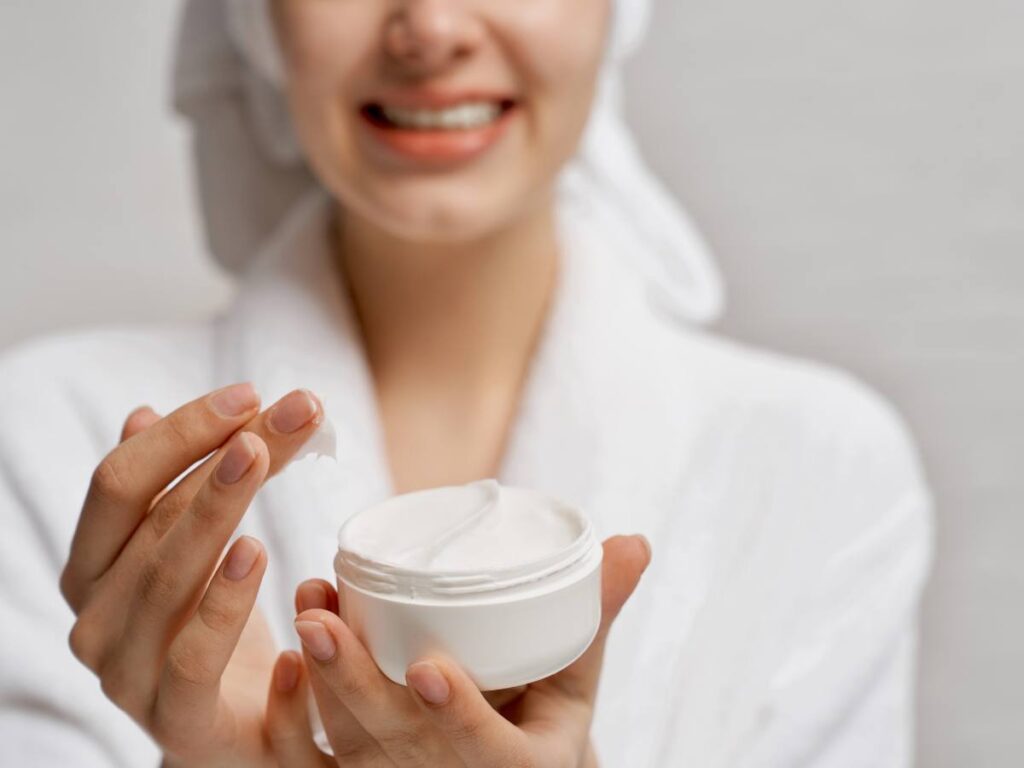A good face moisturizer is a non-negotiable staple in any skincare routine, helping you achieve smooth, hydrated, and healthy-looking skin. But with so many options on the market, how do you know which moisturizer is right for you? This article will break down everything you need to know about selecting the best face moisturizer for your skin type and needs.

Image in Canva Pro
In This Article
What Makes a Moisturizer Good?
Not all moisturizers are created equal, and a “good” moisturizer depends largely on its ingredients and how well it complements your skin type. Key elements like hydration, nourishment, and protection from environmental factors make for a truly effective face moisturizer.
Benefits of Using a Good Face Moisturizer
- Hydration and Moisture Balance
A quality moisturizer keeps your skin hydrated, helping to maintain its natural moisture balance. This prevents dryness and supports a plump, soft texture.
- Protection from Environmental Stressors
Many moisturizers are packed with antioxidants, which defend the skin from environmental stressors like pollution and UV radiation.
- Anti-Aging Benefits
Good moisturizers can also have anti-aging properties, reducing the appearance of fine lines and promoting a youthful glow.
Types of Face Moisturizers
- Gel-based Moisturizers
Gel-based options are lightweight and ideal for oily or combination skin as they provide hydration without leaving a greasy residue.
- Cream-based Moisturizers
Cream moisturizers are richer and thicker, making them perfect for dry or mature skin types in need of extra nourishment.
- Oil-based Moisturizers
These are excellent for very dry skin or during harsh winter months, providing a heavy dose of hydration.
Water-based Moisturizers
Water-based moisturizers are generally suitable for all skin types, especially sensitive skin, as they are gentle and non-irritating.
How to Choose the Right Moisturizer for Your Skin Type
Selecting the right moisturizer means understanding your skin’s unique needs. Here’s a quick guide for each skin type:
- Moisturizers for Dry Skin
Opt for cream-based or oil-based formulas rich in ingredients like hyaluronic acid and ceramides to lock in moisture.
- Moisturizers for Oily Skin
Look for gel-based, non-comedogenic moisturizers to hydrate without clogging pores. Ingredients like salicylic acid can also help control oil.
- Moisturizers for Combination Skin
A water-based or gel moisturizer is often the best choice, as these provide balanced hydration without excess oil.
- Moisturizers for Sensitive Skin
Choose products with minimal ingredients and no added fragrance. Hypoallergenic options are also ideal for reducing irritation.
Ingredients to Look For in a Good Face Moisturizer
Effective moisturizers often include:
- Hyaluronic Acid: Deeply hydrates and plumps the skin.
- Ceramides: Strengthen the skin barrier and retain moisture.
- Glycerin: Draws moisture into the skin, keeping it hydrated.
Avoid products containing parabens, synthetic fragrances, and alcohols, which can dry out or irritate the skin.
Best Times to Apply Face Moisturizer
Applying your face moisturizer twice a day—morning and night—helps maintain skin hydration throughout the day. In the morning, opt for a moisturizer with SPF, and in the evening, a more nourishing, richer cream can be applied.
How Much Moisturizer Should You Use?
A pea-sized amount is generally sufficient for the entire face. Adjust the amount based on your skin’s needs, using slightly more if you have dry skin.
The Role of SPF in Face Moisturizers
SPF is essential in daytime moisturizers for protection against harmful UV rays. Consider a minimum SPF of 30 to ensure adequate coverage.
Homemade vs. Store-Bought Moisturizers
Homemade moisturizers can be budget-friendly and free from synthetic ingredients, but they may lack the efficacy and safety of scientifically formulated store-bought products. High-quality store-bought options often contain specialized ingredients tailored to specific skin concerns.
Tips for Making the Most Out of Your Moisturizer
To maximize hydration, apply moisturizer to slightly damp skin after cleansing. Layering with serums or facial oils can also boost your moisturizer’s efficacy.
Common Mistakes to Avoid When Using Moisturizers
Avoid these common moisturizing mistakes:
- Using too much or too little product
- Skipping moisturizer in humid or hot weather
- Applying too close to the eyes, unless the product is eye-safe
Top Recommended Face Moisturizers for Every Skin Type
There are various options available that work well for different skin types:
Dry Skin:
No products found.
Oily Skin:
No products found.
Combination Skin:
No products found.
Sensitive Skin:
No products found.
How to Store Your Face Moisturizer
Most moisturizers have a shelf life of about 12 months. Keep them in a cool, dry place away from sunlight to preserve their effectiveness.
Conclusion
A good face moisturizer is key to healthy, hydrated skin. By choosing a moisturizer suited to your skin type and applying it correctly, you can enjoy all the benefits of a glowing, nourished complexion. Moisturizing is a simple yet powerful step in your skincare routine that shouldn’t be skipped.
FAQs
Q1. How often should I apply face moisturizer?
Twice daily, in the morning and evening, for best results.
Q2. Can I use the same moisturizer for day and night?
Yes, but a night moisturizer can offer richer hydration if desired.
Q3. How do I know if a moisturizer is working?
Your skin should feel smooth, hydrated, and comfortable without any tightness or dryness.
Q4. Are natural moisturizers better for the skin?
Not necessarily. Natural products can be beneficial, but store-bought moisturizers are formulated for specific skin needs.
Q5. Should I use moisturizer if I have oily skin?
Yes, oily skin needs hydration too. Choose a lightweight, oil-free formula.

